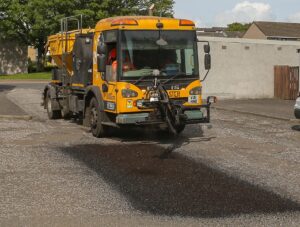A report outlining how City of York Council proposes to manage weed treatment on the city’s highways, will be taken to a public meeting for approval next week.
Like many other councils, York has used the herbicide, glyphosate as the basis for weed treatment for many years, primarily to control weeds on the highway network.
In recognition of the concerns being raised about the environmental impact of glyphosate, the Executive agreed in March 2021, as part of the Pollinator Strategy, that alternative treatments would be trialled.
The approaches to weed treatments, generally fall into three broad areas of chemicals, heat or manual labour.
Over the course of the last year, trials were undertaken across the city using alternative weed chemical treatments (Acetic Acid and Nonanoic Acid).
Based on the local trial, glyphosate has been identified as the most effective chemical treatment currently available, and on performance alone officers would not recommend acetic or nonanoic acid.
Additionally, acetic acid is not recommended as it has additional health risks to both the applicant and the public. The recommended strength to kill weeds can also burn the skin.
Other options were also considered as part of this trial including non-chemical treatments such as manual weeding.
However, manual weeding was found to require additional staff and significant investment in terms of staff, vehicles and tools.
The report also identifies what treatments other local authorities use, to provide examples of how effective they have been and what approaches have worked best.
Hot foam treatment is not widely used across the country due to the risks associated and concerns over how long it would take to treat a city’s road network. Applying hot foam to plants will also have environmental impacts, not least the 1,000 litres of hot water used each day. Significant investment would be required in new equipment and training alongside extra staff.
Cllr Paula Widdowson, Executive Member for Environment and Climate Change, at City of York Council, said: “We recognise that more could be done to control weed growth in the city, so the initial trial of alternative weed treatments has certainly been very valuable.
“Climate change is impacting on our landscape, with predicted warmer and wetter summers expected, so we know weed growth is changing.
“We want to understand the steps we need to take, and this report outlines how we can tackle weed growth in the most sustainable and environmentally friendly way possible, supporting our drive to a cleaner and greener city.”
The majority of the highway spraying in York is carried out on behalf of the council by an external contractor through a fixed term contract. The current contract has now expired and the decision taken in the report will inform the award of a future contract commencing for the 2022 growing season and the next two years.
It is recommended that the treatment frequency is three times per year commencing in April, July and September.
It is also proposed glyphosate remains the treatment of choice for weeds on the highway, with the option of other treatments in specific problem areas. Further trials may be undertaken with alternative treatments, once there have been developments in the market place.
This decision is also endorsed by advice from public health experts, based on a 2017 study by the European Food Safety Authority (EFSA), which indicated that glyphosate does not pose a risk to human health.
The report will be taken to an Executive Member for the Environment and Climate Change decision session on Wednesday 12 January at 3pm.
























